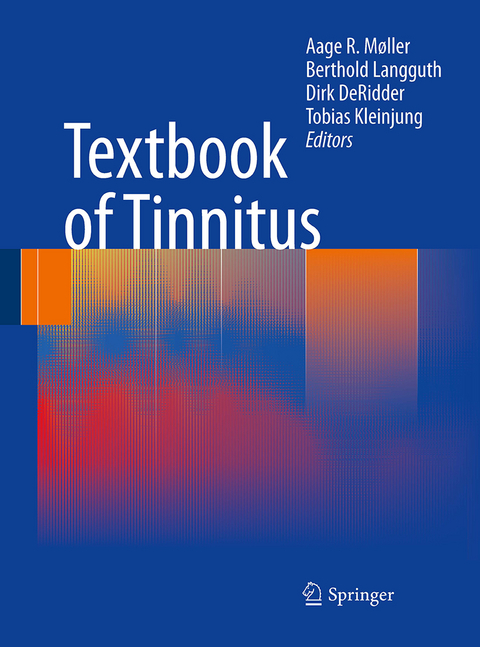
Textbook of Tinnitus
Springer-Verlag New York Inc.
978-1-4939-3981-7 (ISBN)
Introduction.- Different forms of tinnitus.- Hyperacusis and disorders of loudness perception.- Misophonia, phonophobia and “exploding head” syndrome.- Epidemiology of tinnitus in adults.- Epidemiology of Tinnitus in Children.- Genetic risk factors in chronic tinnitus.- Anatomy and physiology of the auditory system.- Interaction between somatosensory and auditory systems.- Pathology of the auditory system that can cause tinnitus.- The role of auditory deprivation.- The role of neural plasticity in tinnitus.- Neural Synchrony and Neural Plasticity in Tinnitus.- Similarities between tinnitus and pain.- Anatomy and physiology of pain.- Behavioral Animal Models of Tinnitus, Pharmacology, and Treatment.- Objective signs of tinnitus in humans.- Functional Neuroimaging.- Findings from Structural Neuroimaging.- A Global Brain Model of Tinnitus.- A heuristic Model of Tinnitus.- Methodology of clinical trials for tinnitus.- The otolaryngologist.- The Role of the Audiologist in Tinnitus Practice.- Tinnitus from the perspective of the psychologist.- The neurologist.- The Psychiatrist.- The neurosurgeon.- The dentist.- The Pharmacologist.- The neuroscientist.- The patient.Introduction.- Conductive and cochlear hearing loss.- Tinnitus and hearing loss.- Cochlear and non-cochlear age-related hearing loss and tinnitus.- Noise-Induced Hearing Loss: Implication for Tinnitus.- Tinnitus and Ménière's Disease.- Tinnitus and Vestibular Schwannoma: Overview and Clinical Correlations.- Microvascular compression of the vestibulocochlear nerve.- Causes of tinnitus: cerebrovascular diseases.- Complications to medical treatment.- Tinnitus caused and influenced by the somatosensory system.- Tinnitus and the masticatory system.- Introduction.- Algorithm for the diagnostic and therapeutic management of tinnitus.- History and Questionnaires.- Clinical otologic assessment.- Audiologic clinical assessment.- Clinical otoneurological examination.- Diagnosis of tinnitus: neurologicalexamination.- Diagnosis of Somatosensory Tinnitus.- Differential diagnosis of temporomandibular joint and masticatory muscle disorders in patients with tinnitus.- Psychologic/Psychiatric Assessment.- Introduction.- Sudden Hearing Loss and Tinnitus.- Tinnitus and hyperacusis / phonophobia.- Clinical description of a different form of tinnitus: intermittent tinnitus.- Pulsatile tinnitus.- Ménière's disease and tinnitus.- Tinnitus with headache.- Tinnitus and psychiatric co-morbidity.- Tinnitus and depression.- Tinnitus and Anxiety.- Tinnitus and sleep.- Posttraumatic tinnitus.- Traumatic Brain Injury and Blast Exposures: Auditory and Vestibular Pathology.- Introduction.- The prevention of tinnitus and noise induced hearing loss.- Counseling and Psycho-education for Tinnitus Management.- Cognitive Behavioral Treatment (CBT).- Auditory Training in Tinnitus.- Tinnitus Retraining Therapy.- Sound stimulation.- Rehabilitation of Tinnitus Patients using the Neuromonics Tinnitus Treatment.- Middle ear implantable devices in tinnitus treatment.- Cochlear Implants and tinnitus.- Pharmacological Approaches to Tinnitus.- The Endocannabinoid System In The Cochlear Nucleus And Its Implications For Tinnitus.- Treatment of Somatosensory Tinnitus.- Tinnitus treatment: botulinum toxin.- Introduction.- Surgical treatment: The ear.- Long Term Follow Up of Microvascular Decompression for Tinnitus.- Vestibular schwannoma.- Neuromodulation.- Neurobiofeedback.- Transcranial magnetic stimulation.- Transcranial Direct Current Stimulation (tDCS): A new tool for the treatment of tinnitus?.- Auditory cortex stimulation for tinnitus.- Cutaneous stimulation.- Complementary tinnitus therapies.- Low-level laser therapy.- Similarities between treatments of tinnitus and central pain.- Treatment strategies of temporomandibular joint and masticatory muscle disorders in patients with tinnitus.
| Erscheinungsdatum | 19.08.2017 |
|---|---|
| Zusatzinfo | XXX, 785 p. |
| Verlagsort | New York |
| Sprache | englisch |
| Maße | 193 x 260 mm |
| Themenwelt | Medizin / Pharmazie ► Gesundheitswesen |
| Medizinische Fachgebiete ► Chirurgie ► Neurochirurgie | |
| Medizin / Pharmazie ► Medizinische Fachgebiete ► HNO-Heilkunde | |
| Medizin / Pharmazie ► Medizinische Fachgebiete ► Neurologie | |
| Medizin / Pharmazie ► Medizinische Fachgebiete ► Psychiatrie / Psychotherapie | |
| Medizin / Pharmazie ► Studium | |
| Schlagworte | Auditory nervous system • auditory system • Cochlear implants • Continuous tinnitus • hearing • Hearing aids • High Frequency • Hyperacusis • Intermittent tinnitus • Low frequency • Microvascular decompression • Neural plasticity • Phonophobia • Plastic changes • Posttraumatic tinnitus • Pulsatile tinnitus • Somatic tinnitus • Tinnitus • Transcranial magnetic stimulation |
| ISBN-10 | 1-4939-3981-5 / 1493939815 |
| ISBN-13 | 978-1-4939-3981-7 / 9781493939817 |
| Zustand | Neuware |
| Informationen gemäß Produktsicherheitsverordnung (GPSR) | |
| Haben Sie eine Frage zum Produkt? |
aus dem Bereich


